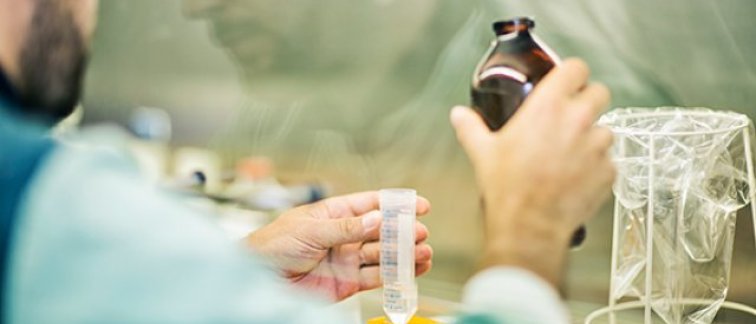Music to support meaning-making for people with incurable cancer
Niels van Poecke, a researcher at the department of medical oncology, will conduct research into how music can contribute to meaning-making for people with incurable cancer. Music plays an important role in regulating our emotions, evoking memories, and shaping our life story. Little is currently known about how people with cancer use music in their daily lives, especially in the palliative phase. Van Poecke aims to develop music interventions that support patients in integrating this experience into their personal life narrative. This research offers an innovative approach to improving the quality of life for people with incurable cancer through music. (€738.595,05)
New approach to activate the immune system in colorectal cancer
Therapies that strengthen the immune system can help fight tumors. Unfortunately, these treatments often do not work well in patients with metastases. One key reason is an abnormal sugar layer on cancer cells. Every cell in our body has a coating of sugars, but in cancer cells this layer is disrupted. As a result, they contain sugar components that are much less common, such as the sialic acid component. This substance suppresses the immune system and makes it harder to attack colorectal tumors. Sandra van Vliet, a researcher at the department of molecular cell biology and immunology, will study this sialic acid component and its role in tumors in the abdominal cavity. The researchers believe this substance “switches off” the immune system. By inhibiting the production of sialic acid, they hope to reactivate the immune system and improve the treatment of metastatic tumors. (€858.822)
Triconjugate cancer vaccines offer hope for more effective immunotherapy
Joke den Haan, a researcher at the department of molecular cell biology and immunology, aims to develop a more powerful cancer vaccine that is better processed by the immune system. This could strengthen the immune response against cancer and increase the effectiveness of checkpoint inhibitors, allowing more patients to benefit from the treatment. Checkpoint inhibitors are a promising form of immunotherapy, but they do not work for all cancer patients. Joke den Haan is working on an innovative solution: triconjugate cancer vaccines. These vaccines combine three components: a targeting code to direct the vaccine to the right immune cell, a cancer antigen, and a stimulating molecule to activate the immune system. This gives the immune system an extra boost to attack cancer cells more effectively. (€814.915)
New test for better treatment of kidney and thyroid Cancer
In cases of metastatic kidney and thyroid cancer, multi-kinase inhibitors (MKIs) are often used. However, these medications do not work for everyone and frequently cause side effects. Research led by Connie Jimenez, Professor of Translational OncoProteomics at the department of medical oncology, focuses on developing a test that can predict which patients will benefit from this therapy. By analyzing proteins in tumors and their activation states, the study aims to identify which kinases are driving tumor growth and need to be inhibited. This test will help select the most suitable treatment for each individual with kidney or thyroid cancer. It will make therapies more effective and reduce side effects, an important step toward personalized care. (€897.169,40)

